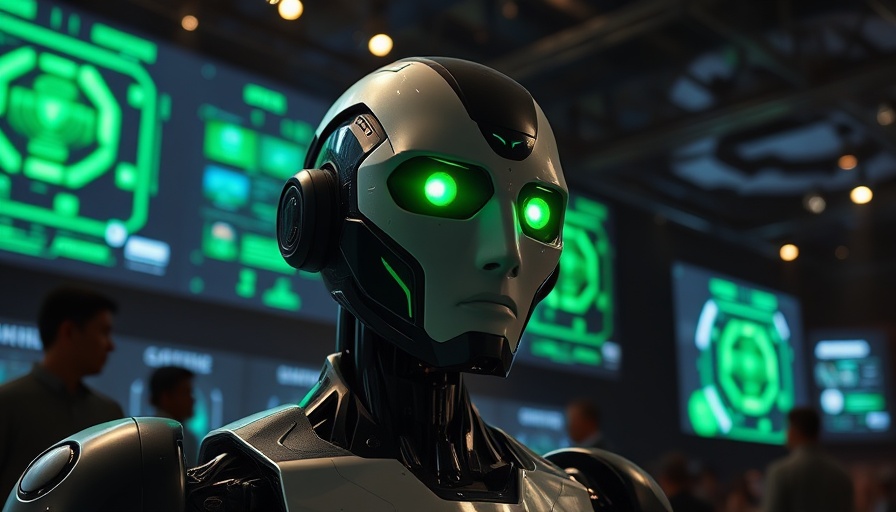
Google's Gemini 3: A Game Changer in AI Development
The latest developments in artificial intelligence have sent shockwaves through the tech community, particularly with the anticipated launch of Google's Gemini 3. As AI developers race to improve their models, Google's hidden trials are showing promise that could redefine software performance. Early insiders reporting on Gemini 3 reveal a model that not only excels in coding tasks but boasts heightened graphical precision as well.
In 'Google Gemini 3 Shocks The Internet: Absolutely Mind Blown', the discussion dives into the revolutionary capabilities of Gemini 3, exploring key insights that sparked deeper analysis on our end.
Inside Gemini 3: Exploring Its Capabilities
Early users have noted that Gemini 3 can handle complex coding tasks with alarming speed and efficiency. For instance, the system's ability to generate precise Scalable Vector Graphics (SVG) quickly has researchers buzzing. Moreover, Gemini 3's dual models—Pro and Flash—allow it to cater not only to heavy-duty users but also to those who need high-speed responses.
These developments have positioned Google to potentially reach over 500 million users by the year's end, aligning with other tech giants who are pushing new boundaries, including OpenAI's advancements. While Google's ecosystem integrates Gemini across Chromebooks, Android devices, and various productivity tools, the direct competition signifies a shift not just in the capabilities of AI, but in how these technologies will intertwine with our daily tools.
The Impact on the Local Ecosystem: Michigan's Role
For Michigan and its growing tech hubs such as Metro Detroit, these advancements in AI bring thrilling opportunities for innovation and venture funding. The introduction of powerful AI models like Gemini 3 could catalyze local ventures that depend on software development, transforming the landscape of Michigan's digital ecosystem.
From startups focused on machine learning and data analytics to more established players in cloud computing and cybersecurity, the introduction of sophisticated AI may pivot the focus of local tech founders and investors toward creating solutions that leverage these advancements. As industry leaders discuss the ramifications of enhanced AI capabilities, we must consider the potential of Detroit tech startups to lead in this arena.
Future Innovations to Watch: Open Source Competition
The landscape of AI isn't solely shaped by established corporations like Google and OpenAI. An exciting development has arisen from the open-source community with the launch of a model called OV. This innovation allows users to convert text into short, animated video clips—an impressive functionality that, while currently limited to five seconds, indicates a burgeoning field for creative applications. For those leveraging open-source technology in the region, this may present significant new avenues for app development and integration with existing projects.
OpenAI's Eye-Opening Study: What It Means for Local Workforce
A recent report from OpenAI sheds light on the future of employment in relation to AI advancements. According to their findings, AI systems can outperform human workers in nearly half of tasks within certain industries. Additionally, predictions from industry leaders suggest a potential future where many roles—including powerful positions, such as that of a CEO—may eventually be automated. While this could generate fears regarding job loss, it emphasizes the importance of reskilling Michigan's tech workforce to adapt to new roles that will emerge as a result of these technological advancements.
Preparing for the Future: Emphasizing Education and Innovation
As the AI shift manifests, the need for coding bootcamps and educational initiatives aimed at fostering talent in the areas of AI, robotics, and software development becomes paramount. For Metro Detroit, integrating curriculums that encompass these technologies will ensure that future generations are equipped to thrive in this AI-centric landscape.
With major tech events on the horizon, Michigan's tech community has an opportunity to lead discussions around AI ethics and implementation. The convergence of local startup innovation, talent from coding bootcamps, and substantial venture funding carries the potential to position Michigan as an important statewide player in the global AI market.
Conclusion: Embracing Change in Metro Detroit
The race for developing leading AI tools is ongoing, with Google's Gemini 3 setting new standards for capabilities in automating complex tasks. For Michigan’s innovators and entrepreneurs, this signals not only the arrival of exciting new tools but also a future ripe with opportunities for impactful AI integration.
As tech founders, professionals, and investors in Metro Detroit, it is crucial to embrace these technological advancements and actively engage with the evolving landscape. Local engagement can significantly influence how effectively we harness AI for economic and social growth in the region.
 Add Row
Add Row  Add
Add 



Write A Comment